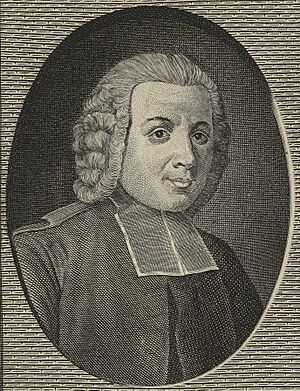Jean-Baptiste Dubos facts for kids
Quick facts for kids
Jean-Baptiste Dubos
|
|
|---|---|
 |
|
| Born | 14 December 1670 Beauvais, France |
| Died | 23 March 1742 Paris, France |
| Occupation | Diplomat, author |
| Nationality | French |
| Education | University of Paris (MA, BTh) |
| Period | Age of Enlightenment |
| Notable works | Réflexions critiques sur la poésie et sur la peinture (1719); L'Histoire de la Ligue de Cambray (1709-1728) |
Jean-Baptiste Dubos (born December 14, 1670 – died March 23, 1742) was a French writer. He was also a diplomat, which means he represented his country in other nations. He was also a well-known art critic.
Contents
Life Story of Jean-Baptiste Dubos
Jean-Baptiste Dubos was born in Beauvais, France. He studied in Paris and earned two degrees. In 1688, he received a Master of Arts. In 1692, he earned a Bachelor of Theology.
After studying religion, Dubos decided to focus on law and politics. He worked for important government officials. These included the foreign affairs minister and the regent (a ruler who governs when the king is too young). He went on several secret missions for France. Because of his good work, he received a pension (regular payments) and other benefits.
Once he had these rewards, Dubos left political life. He then spent his time studying history and writing. During his travels as a French diplomat, he met many important thinkers. He became good friends with people like Pierre Bayle and John Locke.
Dubos became a very respected writer. In 1720, he was chosen to join the Académie française. This is a very important French group that protects the French language. In 1723, he became its permanent secretary. He held this important position until he died in Paris.
Jean-Baptiste Dubos's Writings
Dubos wrote many important books during his lifetime. His works covered history, politics, and art.
Early Historical Works
Dubos's first book was L'Histoire des quatre Gordiens. It was published in Paris in 1695. This book was about four Roman emperors named Gordian. Even though it was clever, most people were not convinced by his ideas in the book.
During a war that started in 1701, Dubos worked on peace talks. He traveled to the Netherlands and England. To try and convince these countries to make peace, he wrote a book. It was called Les Intéréts de l'Angleterre mal entendus dans la guerre présente. This means "England's Interests Misunderstood in the Present War."
This book shared some secrets and made predictions that did not come true. France's enemies used the book against him. Someone even joked that the title should be "England's Interests Misunderstood by Abbé Dubos." However, the book was notable for predicting that the American colonies would one day break away from Great Britain.
History of the League of Cambrai
Dubos's next major work was L'Histoire de la Ligue de Cambray. This book was published in Paris in 1709. It was later reprinted in 1728 and 1785. It was a clear and interesting history of the League of Cambrai. This was a group of European powers that fought against Venice in the early 1500s. The famous writer Voltaire praised this book.
French Monarchy History
In 1734, Dubos published Histoire critique de l'établissement de la monarchie française dans les Gaules. This long title means "Critical History of the Establishment of the French Monarchy in Gaul." In this book, Dubos tried to prove a new idea. He argued that the Franks (an ancient Germanic people) did not conquer Gaul (ancient France). Instead, he believed they were invited by the people of Gaul to govern them.
This idea was very clever and gained many supporters at first. However, another famous French thinker, Montesquieu, disagreed. He challenged Dubos's ideas in his own important book, The Spirit of the Laws.
Critical Reflections on Art
Dubos's most important work was Réflexions critiques sur la poésie et sur la peinture. This means "Critical Reflections on Poetry and Painting." It was first published in 1719. This book became very important for studying art and beauty in France. It was used as a popular textbook for many years.
What made this book even more remarkable was that Dubos himself was not an artist. He did not have practical experience in painting or poetry. Yet, he discussed the principles of these arts in great detail. This book is famous for helping to make art criticism an important field of study.

